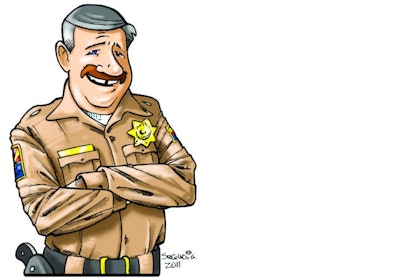 Illustration by Sequoia Blankenship.
Illustration by Sequoia Blankenship.
The other day I was doing an "active shooter" scenario on a 360-degree simulator. What a rush! Unfortunately, I didn't shoot as well as I'd expected, so I worked extra hard and did a couple of other drills to improve my somewhat rusty skills. As I was driving back to the hotel I got to thinking about what a poor shot I had been initially in the academy and how the words of my training sergeant had made all the difference.
I grew up shooting rifles, but I never fired a handgun until I went to the academy. I was jerking the trigger, getting too much front sight, and then seemed to overcorrect every time the instructor corrected my flaws. In the middle of a 15-yard drill the training sergeant was walking behind the line when another firearms instructor looked at my random holes in the target and said, "Smith's having some issues."
"Don't worry about Smith," the sergeant said, walking away. "I know a shooter when I see one." Wow! Sgt. Goodnight had looked into my soul and seen a marksman instead of the inept shooter I appeared to be. For the rest of my time in the academy, I constantly practiced my trigger control and sight picture, and ended up graduating with a perfect score in marksmanship. It wasn't easy. The shooter the sarge had seen didn't appear overnight, but only after hours and hours of on- and off-range practice. Because of his words my weakness had become a strength.
Over the years I have studied the effects of expectations. I have discovered that a trainer has an incredibly powerful role to play in imbuing the trainee with either positive or negative expectations. And our profession demands that we hone skills essential for victory in confrontations.
In the 1960s a groundbreaking study called "Pygmalion in the Classroom" showed how teachers could set students up for failure or success based on the expectations projected by the teacher. Teachers were told one student had high potential and another had average abilities, and then the interactions of the teacher with the various students were observed.
At the end of the semester, sure enough, the "high potential" students had lived up to the expectations of the teacher and the "average" ones had lived down to expectations. Teachers don't necessarily show these expectations with negative comments; it may be as simple as how long a teacher lets a student work on a problem at the blackboard before stopping him or her. More time, more expectation of success; less time, less success.
There are thousands of ways to project positive and negative expectations, which then become self-fulfilling prophecies. A coach shouting, "Good hustle." when you beat out a throw at first is teaching you your effort pays off, vs. a coach who shouts, "You were lucky. The throw was slow," which teaches you that you need luck to achieve.
Take a minute to do a quick mental inventory of the things you do well and the things you do poorly, and then ask yourself what it would take to move the skills in the "poor" list to the "good" one. If your answer is "luck" or "I'm just not good at that," then I challenge you to reframe your mind to believe that almost any skill can be raised dramatically with proper practice and the expectation that you can succeed. Often, we don't do something well because we simply haven't practiced it properly.
Ten thousand bad repetitions don't make you good; they only make your bad technique permanent. Get good coaching and your skill will improve with practice, guaranteed. It isn't "practice makes perfect," but rather "perfect practice makes perfect." And remember, underlying any high-level performance is a foundation of high expectations.
I was not a good shooter when I entered the academy, but I expected to become one, and many times I walked off the range deeply disappointed yet swearing to work harder, simply because of the words of my sergeant. Think about this if you are training or coaching others. And also remember that you are your own coach and need to monitor yourself for any low expectations someone may have infected you with; you need to take control and flush the negative out.
I want every crime fighter to go into every confrontation expecting to win. And that starts by making sure your skills are the best you can make them, with your highest expectations. Get going, winner.
Dave Smith is an internationally recognized law enforcement trainer and is the creator of "JD Buck Savage." You can follow Buck on Twitter at @thebucksavage.













